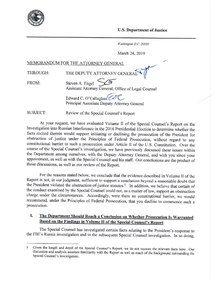
The United States attorney general (AG) is the head of the United States Department of Justice (DOJ) and is the chief law enforcement officer of the federal government of the United States. The attorney general serves as the principal advisor to the president of the United States on all legal matters. The attorney general is a statutory member of the Cabinet of the United States.
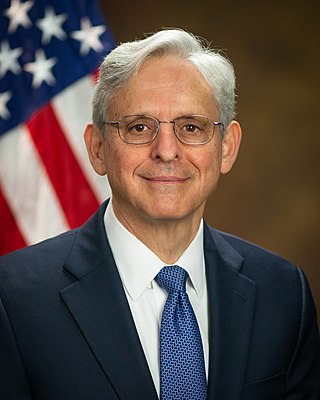
Merrick Brian Garland is an American lawyer and jurist who has served as the 86th United States attorney general since 2021. He previously served as a circuit judge of the United States Court of Appeals for the District of Columbia Circuit from 1997 to 2021. In 2016, President Barack Obama nominated Garland to the U.S. Supreme Court, but the Republican-led U.S. Senate did not hold a vote to confirm him.

John Choon Yoo is a South Korean-born American legal scholar and former government official who serves as the Emanuel S. Heller Professor of Law at the University of California, Berkeley. Yoo became known for his legal opinions concerning executive power, warrantless wiretapping, and the Geneva Conventions while serving in the George W. Bush administration, during which he was the author of the controversial "Torture Memos" in the War on Terror.

The Office of Legal Counsel (OLC) is an office in the United States Department of Justice that supports the attorney general in their role as legal adviser to the president and all executive branch agencies. It drafts legal opinions of the attorney general and provides its own written opinions and other advice in response to requests from the counsel to the president, the various agencies of the executive branch, and other components of the Department of Justice. The office reviews and comments on the constitutionality of pending legislation. The office reviews any executive orders and substantive proclamations for legality if the president proposes them. All proposed orders of the attorney general and regulations that require the attorney general's approval are reviewed. It also performs a variety of special assignments referred by the attorney general or the deputy attorney general.

William Pelham Barr is an American attorney who served as United States attorney general in the administration of President George H. W. Bush from 1991 to 1993 and again in the administration of President Donald Trump from 2019 to 2020.
Daniel Bernard Levin served as Acting Assistant Attorney General for the Office of Legal Counsel of the U.S. Justice Department from July 2004 until February 2005. He is notable for having upheld legal opinions during the Bush administration that narrowly defined torture and authorized enhanced interrogation techniques. These opinions were mostly secret during this period, but rumors of abuse of prisoners were widespread, particularly after the 2004 Abu Ghraib prisoner torture and abuse scandal in Iraq. These opinions were repudiated in 2009 by the Obama administration.

Steven Gill Bradbury is an American lawyer and government official who served as the General Counsel of the United States Department of Transportation. He previously served as Acting Assistant Attorney General from 2005 to 2007 and Principal Deputy Assistant Attorney General from 2004 to 2009, heading the Office of Legal Counsel (OLC) in the U.S. Department of Justice during President George W. Bush's second term.

Edward Casey O'Callaghan is an American attorney and former U.S. Department of Justice official.
Dawn Elizabeth Johnsen is an American lawyer and the Walter W. Foskett Professor of Constitutional law, on the faculty at Maurer School of Law at Indiana University in Bloomington, Indiana. She previously served in the Biden administration as Acting Attorney General at the Office of Legal Counsel, having been appointed on January 20, 2021, by President Joe Biden, to return to the role she previously held in the Clinton administration. She was succeeded in that role in a permanent capacity by Christopher H. Schroeder, and is currently serving as the Principal Deputy Assistant Attorney General in the same office.
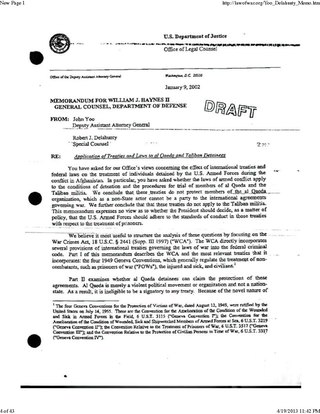
A set of legal memoranda known as the "Torture Memos" were drafted by John Yoo as Deputy Assistant Attorney General of the United States and signed in August 2002 by Assistant Attorney General Jay S. Bybee, head of the Office of Legal Counsel of the United States Department of Justice. They advised the Central Intelligence Agency, the United States Department of Defense, and the President on the use of enhanced interrogation techniques—mental and physical torment and coercion such as prolonged sleep deprivation, binding in stress positions, and waterboarding—and stated that such acts, widely regarded as torture, might be legally permissible under an expansive interpretation of presidential authority during the "War on Terror".

Jeffrey Adam Rosen is an American lawyer who served as acting United States attorney general from December 2020 to January 2021 and as United States deputy attorney general from 2019 to 2020. Before joining the Department of Justice, he was a senior partner at the law firm Kirkland & Ellis and was the United States deputy secretary of transportation.
Curtis E. Gannon is an American lawyer. He is a Deputy Solicitor General, a career position, in the Office of the Solicitor General of the United States. He previously served as the Principal Deputy Assistant Attorney General for the Office of Legal Counsel of the United States Department of Justice. He was appointed to this position on January 20, 2017, by President Donald Trump.

The Robert Mueller special counsel investigation was an investigation into 45th U.S. president Donald Trump regarding Russian interference in the 2016 United States elections and was conducted by special prosecutor Robert Mueller from May 2017 to March 2019. It was also called the Russia investigation, Mueller probe, and Mueller investigation. The investigation focused on three points:
- Russian interference in the 2016 United States elections
- Trump associates and their connection to Russian officials and espionage
- Possible obstruction of justice by Trump and his associates
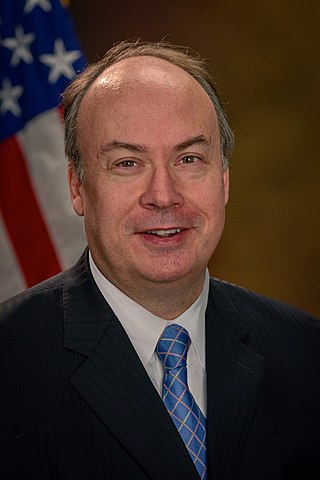
Jeffrey Bossert Clark is an American lawyer who was Assistant Attorney General for the Environment and Natural Resources Division from 2018 to 2021. In September 2020, he was also appointed acting head of the Civil Division. In 2020 and 2021, Clark allegedly helped then-president Donald Trump attempt to overturn the 2020 presidential election. Clark's actions in that endeavor were reviewed by the District of Columbia Bar – the entity authorized by law to pursue attorney discipline and disbarment in the District of Columbia – which recommended discipline to the DC Court of Appeals in July 2022, and in August 2024 its Board on Professional Responsibility recommended a two year suspension of his law license. He was identified as an unindicted co-conspirator in the federal prosecution of Donald Trump over attempts to overturn the 2020 election. On August 14, 2023, he was indicted along with 18 other people in the prosecution related to the 2020 election in Georgia.
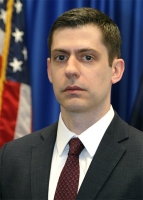
John Franklin Bash III is an American attorney who served as the United States Attorney for the United States District Court for the Western District of Texas from 2017 to 2020.

The Barr letter is a four-page letter sent on March 24, 2019, from Attorney General William Barr to leaders of the House and Senate Judiciary Committees purportedly detailing the "principal conclusions" of the Mueller report of the Special Counsel investigation led by Robert Mueller into Russian efforts to interfere in the 2016 United States presidential election, allegations of conspiracy or coordination between Donald Trump's presidential campaign and Russia, and allegations of obstruction of justice.

The Mueller report, officially titled Report On The Investigation Into Russian Interference In The 2016 Presidential Election, is the official report documenting the findings and conclusions of former Special Counsel Robert Mueller's investigation into Russian efforts to interfere in the 2016 United States presidential election, allegations of conspiracy or coordination between Donald Trump's presidential campaign and Russia, and allegations of obstruction of justice. The report was submitted to Attorney General William Barr on March 22, 2019, and a redacted version of the 448-page report was publicly released by the Department of Justice (DOJ) on April 18, 2019. It is divided into two volumes. The redactions from the report and its supporting material were placed under a temporary "protective assertion" of executive privilege by then-President Trump on May 8, 2019, preventing the material from being passed to Congress, despite earlier reassurance by Barr that Trump would not exert privilege.
This is a timeline of events from 2020 to 2022 related to investigations into the many suspicious links between Trump associates and Russian officials and spies relating to the Russian interference in the 2016 United States elections. It follows the timeline of Russian interference in the 2016 United States elections, both before and after July 2016, until November 8, 2016, election day, the transition, the first and second halves of 2017, the first and second halves of 2018, and the first and second halves of 2019.
The United States Department of Justice under the Trump administration acquired by a February 2018 subpoena the Apple iCloud metadata of two Democrats on the House Intelligence Committee, several others associated with the committee, and some of their family members. The subpoena covered 73 phone numbers and 36 email addresses since the inception of the accounts. Seizing communications information of members of Congress is extraordinarily rare. The department also subpoenaed and obtained 2017 and 2018 phone log and email metadata from news reporters for CNN, The Washington Post and The New York Times. Apple also received and complied with February 2018 subpoenas for the iCloud accounts of White House counsel Don McGahn and his wife. Microsoft received a subpoena relating to a personal email account of a congressional staff member in 2017.

